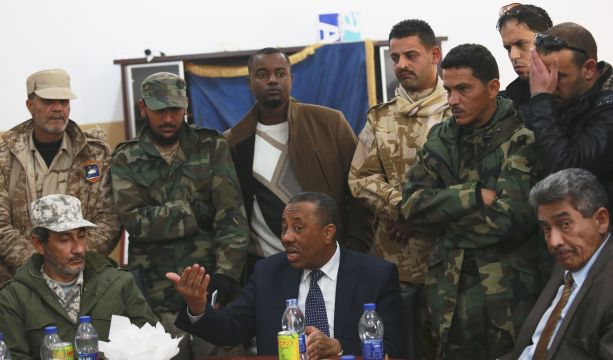
Libya’s internationally recognized Prime Minister Abdullah Al-Thani (C) attends a meeting with ministers as well as leaders of the Libyan army in Benghazi, on February 1, 2015. (Reuters/Esam Omran Al-Fetori)
Cairo, Asharq Al-Awsat—The decision by Libya’s parliament to withdraw from UN-brokered negotiations was made in order to sideline the Muslim Brotherhood from any future unity government, a Libyan official told Asharq Al-Awsat.
The talks have been suspended as a result of parliament’s withdrawal.
A Libyan official, affiliated to the internationally recognized government of Abdullah Al-Thani, told Asharq Al-Awsat: “This decision [to suspend the talks] means that there is tacit agreement between Libya’s legislative and executive branches of power to thwart UN envoy Bernardino Leon’s attempts to create a national unity government that includes the Muslim Brotherhood and armed militia commanders.”
Libya currently has two rival governments: One recognized abroad and led by Thani, with its parliament based in Tobruk, and another headquartered in Tripoli and composed of members of Libyan’s previous transitional government, the General National Congress (GNC).
A second Libyan official, a member of Thani’s parliament, confirmed that the legislative body voted to withdraw from the UN-brokered talks due to dissatisfaction with Leon’s attempts to establish a national unity government.
The UN had been planning to hold a new round of talks in Morocco this week to reach a political solution to resolve the deteriorating crisis in the North African country, but the Libyan parliament’s withdrawal has put an end to the latest round of talks.
Parliamentary sources informed Asharq Al-Awsat that Leon was looking to announce a new national unity government in Morocco, the composition of which the Tobruk-based parliament opposes.
MP Tariq Al-Jaroushi told Asharq Al-Awsat: “The UK and US governments would have immediately recognized this government, regardless of the Libyan parliament’s decision, which has the legitimate right to do so.”
